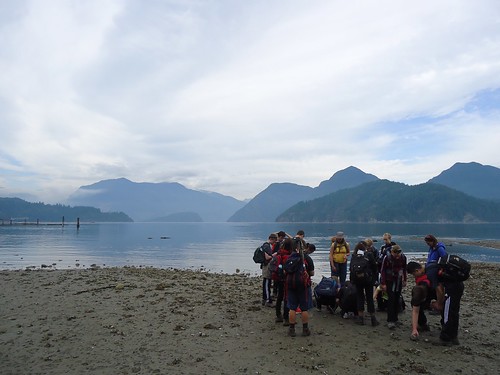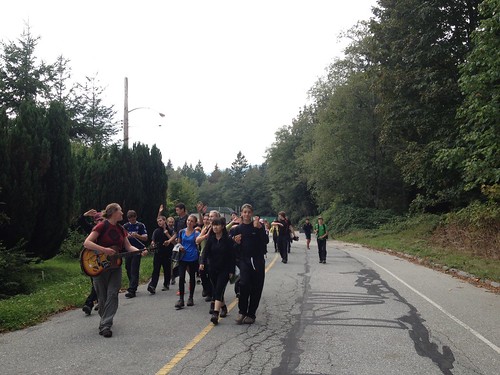Whether working with the TALONS, philosophers, or the #IntroGuitar community, I am fortunate to get to spend a good deal of time planning lessons and thinking of learning experiences that are not only ‘memorable,’ but hopefully also: personal, meaningful and – optimally – transformative. I would agree with a definition that sees learning as Jeanne Ellis Ormrod describes it:
“A long-term change in mental representations and associations due to experience[.]”
The theoretical approaches that I bring to this view of learning are largely inspired by constructivism and sociocultural theory, as well as the networked processes at the heart of connectivism. Defined in this week’s EDCI 335 reading, constructivists:
suggest that people create (rather than absorb) knowledge from observations and experiences.
More and more I have come to see both the ‘hidden curriculum‘ and the provincially required curriculum as bound to Foucault’s vision of Enlightenment, which should not be considered:
a theory, a doctrine, nor even as a permanent body of knowledge that is accumulating; it has to be conceived as an attitude, an ethos, a philosophical life in which the critique of what we are is at one and the same time the historical analysis of the limits that are imposed on us and an experiment with the possibility of going beyond them.”
I’ve come to think that memorable learning resides in such “experiments with the possibility” of going beyond our limits, when we are able to experience transgression of our boundaries and the potential and peril that such risk-taking involves.
Last spring I reflected on the work of:
Gregory Bateson, [who] describes these learning opportunities as “breaches in the contextual structure,” whereby individuals gain an understanding of the process involved in implementing “corrective change in the system of sets of alternatives from which choice is made.”
This sort of “third order” thinking is driven by a confrontation with “systemic contradictions in experience” (this is taken from University of Virginia prof Eric Bredo); to the outdoor educator, this double bind is represented by the necessity of learning to provide both the freedom to explore, as well as the structure and guidance that creates safe opportunities for growth.
Gardner Campbell points out that learning in this capacity puts participants – teachers and students and parents alike – to vulnerability. “It puts the self at risk,” he says. “The questions become explosive,” and “involve “the kinds of risks that learners, at their best, will be willing to take.”
It is a vision of learning that I think goes beyond the mass concerns of institutional education obsessed with accountability, but speaks to John Dewey’s dual intentions for public schooling:
- To transmit the facts, dispositions and cultural heritage society considers to be of value; and
- To raise a younger generation with the skills, persistence and ingenuity to transcend our historical moment.
In addition to being encultured to the traditions of our society’s ideals, meaningful, memorable learning is what Richard Dixon meant when he told me that
“Every class is just another opportunity for young people to practice forming communities.”

The British Columbian outdoors have lent themselves admirably to this task:
We walked out into the woods and within minutes were greeted in our silences by the persistent hooting of an owl presiding over the camp for the duration of our solo. Scattered across the forest floor, in a blackness that enveloped all but the distant moon shining off the lake below, the owl rang its voice across the treetops, cradling us all. When I called out finally for the solo to end, seconds swelled and stretched in silence as no one wanted the moment to be gone.
Our ambition as TALONS facilitators is often to nurture these individual worlds, where everything needed for survival, or even thriving, is brought along in backpacks and the people assembled in a given place. Enjoying the peace of sitting in the woods at night alone, a serenity connected to the most basic of human fears of loneliness, made possible in the company of trusted peers.
As have the annual rituals provided by annual TALONS events and adventures, when the (two grade 9/10 cohorts) each set about “creating something that is honest, magical, and their own.” On a night like the annual Night of the Notables, for instance:
There is prolonged thunderous applause. Standing ovations. In all, it is quite a thing to see happen. Truly. Even if it is hard to say just what it is that happened up there on that stage and in the halls of our school tonight.
Because just as it feels a little bit my own, how I take in the night’s triumph against the backdrop of those that have preceded it, how everyone in the room experiences the evening is measured against their own sense of the vulnerability felt by those in the present ‘hot seat.’ From the college kids in the back to the grade nines sitting in the second row (to the teacher grinning in the balcony), everyone in the TALONS orbit has gathered to give it up for those whose task it is this year to set aside their fears, come together as a group, and dare to do something exceptional.
Something exceptional, like forming a band and playing your first gig just after locker cleanout on one of the last days of the school year:
On the last day of class, many of the Bears made a point of hanging around for a few minutes to take pictures with one another, shake my hands and otherwise linger in the magical atmosphere the guitar classroom had been transformed into by their efforts.
“This class was more than a class,” one of the young men who was graduating told me on his way out the door. “Just what it was, I’m not sure. But it was pretty great.”
Or teaching fellow singers in a Cuban fine arts school the English pronunciations in their new choral number:
What each of these learning opportunities have in common, I think, is that they put the student/learner at the center of the experience, where their individual perception of themselves or their world is expanded somehow. They perform feats not thought possible beforehand, or experience “breaches in the weave of contextual structure”:
- Swimming in the ocean before breakfast,
- Capping a night by first experiencing bioluminescence, or
- Learning what part they can best contribute to a group.
Those are the sorts of things that lead to long-term changes in mental representations and associations.
That is learning.


What I find most compelling concept of your post is that the environments that you describe are not simply a catalyst for “the student”. The community of learners, and the relationships built, create a powerful learning environment for all, including those that would traditionally only been seen as the teachers.